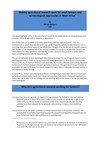Democratising food and agricultural research
IIED's action-research work aimed to help farmers ensure agricultural research better meets farmer's needs and priorities.

Agricultural research has great potential to address the challenges of food security, poverty and sustainable natural resource management. It can generate knowledge, technologies and policies for sustainable agricultural development, working across disciplines, sectors and stakeholder groups. However, the ways in which agricultural research is funded, organised, controlled and practised can have a huge impact on small-scale producers in the global South.
In many countries, research has been driven by external funding, priorities and technological ‘fixes’, such as hybrid seeds, which can erode crop diversity. Yet it is increasingly clear that much publicly funded research has not met the needs or priorities of farmers, particularly of those working on a small scale (less than one hectare of land) in low- and middle- income countries.
Despite their in-depth knowledge of food production, farmers and other producers have rarely been asked to participate in the research process, or been involved in setting research priorities during the development of strategic agricultural research plans. This has been especially true of women farmers, even though they are often deeply knowledgeable about the cultivation, selection and the conservation of seeds – and have a deeper understanding of the culinary and nutritional quality of different crop varieties than men.
Across the world, food producers have begun to raise their voices to ensure that agricultural research better meets their needs and priorities. To do this effectively, farmers and other citizens need inclusive and safe spaces to discuss how to build an agrifood research system that is democratic and accountable. They must also be able to participate in setting the policy agenda for investments in agricultural research that affect them.
Establishing inclusive governance of food systems – where farmers and other citizens play an active role in designing and implementing food and agricultural policies – is not just a matter of equity or social justice. Evidence shows that it can also lead to more sustainable livelihoods and environments.
What IIED did
Several projects were carried out under an international action-research initiative, 'Democratising the Governance of Food Systems. Citizens Rethinking Food and Agricultural Research for the Public Good'. This was based on the belief that research to address agricultural and food-related challenges benefits from the different perspectives, experiences and knowledge of smallholder farmers, pastoralists and scientists. One of IIED's goals was to support knowledge sharing and to broker relationships between these groups.
Projects included the following:
- A series of farmer assessments and citizens’ juries in different parts of the world, which helped farmers to achieve their own vision of agricultural research.
- A high-level policy dialogue between farmers and the Alliance for a Green Revolution in Africa, which developed a shared agenda designed to serve development and the public good.
- A project in the Andes that fostered dialogue between Andean farmers and agricultural researchers, with the aim of increasing the influence that farmers have on agricultural research. These 'wisdom dialogues' created a series of videos where local people discussed indigenous wisdom.
IIED has also engaged directly with the Global Forum on Agricultural Research (GFAR), centres of the Consultative Group on International Agricultural Research (CGIAR) and other agricultural research institutions to develop mechanisms for the effective participation of civil society organisations and agricultural producers.
This area of work was previously led by Dr Michel Pimbert, who is now director of the Centre for Agroecology, Water and Resilience (CAWR) at Coventry University. For more information on these projects you can contact him at michel.pimbert@coventry.ac.uk or visit the website on democratising agricultural research.
Publications
Additional resources
Putting citizens at the heart of food system governance, Michel Pimbert (2012), IIED Briefing
Putting farmers first: reshaping agricultural research in West Africa, Michel Pimbert (2012) IIED Briefing
High level policy dialogue between the Alliance for a Green Revolution in Africa (AGRA) and small scale farmers on the priorities and governance of agricultural research for development in West Africa, IIED, APPG on Agroecology, CNOP, Kene conseils, Centre Djoliba, IRPAD (2012), IIED Project material
Transformation for food sovereignty: transforming knowledge and ways of knowing (Part III: Chapter 7), Michel Pimbert (2009), IIED Book chapter (Spanish version)
Agricultural research for food sovereignty: side event at the Terra Petra Forum on the food crisis, climate, agrofuels and food sovereignty, Michel Pimbert (2008), IIED Presentation
Democratising the Governance of Food Systems: Citizens Rethinking Food and Agricultural Research for the Public Good Workshop Report (2007) IIED Event/workshop report
Website: Democratising agricultural research, Coventry University
Partners
Coordination Nationale des Organizations Paysannes (CNOP)
Centre Djoliba
l’Institut de Recherche et de Promotion des Alternatives en Développement (IRPAD)
l’Union des Radios et Télévisions Libres du Mali (URTEL)






